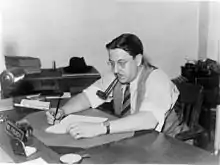
This project page is associated with English 105 at the University of North Carolina, Chapel Hill.
Overview
The Federal Writers’ Project was funded by the federal government under the New Deal during the Great Depression in order to support written work during desperate economic and social times. A number of different projects were undertaken for this initiative, among them was the Folklore Project which consisted of interviewing everyday people from all walks of life from across the country. This page is dedicated to making these life histories public to a worldwide audience, thereby giving these people a permanent place in the online historical record. These life histories detail the complexities of race, gender, class, and the general turmoil of the Great Depression. As such, they are ripe for further historical investigation and analysis. Further, the actual process by which these life histories were created is not without many problems. These life histories are not oral histories, but rather the writer's interpretation of the lives of the people who gave the interviews. As such, these life histories, like all pieces of historical evidence, must be interrogated to understand how they were created, what type of information is included, and what is left out. The following linked pages do just that by giving a biography and explanation of social context of one of the people interviewed, together with an analysis of the historical production of the life history itself.
Project

To complete this project, students worked with original primary sources from the Federal Writers’ Collection at the Southern Historical Collection at the University of North Carolina, Chapel Hill, scholarly sources, and popular sources. With these resources and their own analysis, students not only document the life of the person for a worldwide internet population, but also critically examine the processes of historical production involved in creating life histories in the Federal Writers' Project. Below are links to students projects, which dedicate a page to one person who was interviewed by the Federal Writers' Project.